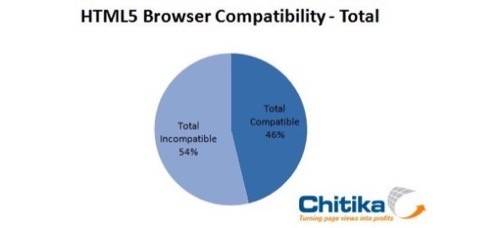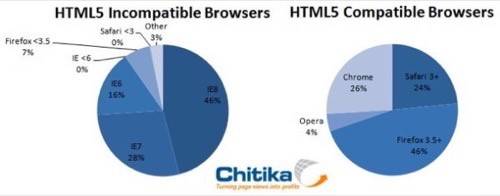HTML5 is quickly becoming an important part of the Web surfing experience, and according to online ad network Chitika, almost half of all Internet users are already using HTML5-compatible browsers. On Chitika’s network, Firefox (version 3.5 and higher) is the most popular of these HTML5-compatible browsers, followed by Chrome and Safari, with Opera coming in a distant fourth in this race. The league of HTML5-incompatible browsers is mostly comprised of different versions of Microsoft’s Internet Explorer.

Firefox 3.5+ makes up almost half of all HTML5-compatible traffic to Chitika’s networks, while Internet Explorer 8 accounts for half of all HTML5-incompatible traffic. To determine a browser’s HTML5 readiness, Chitika looked at the browser’s ability to render HTML5 video.

Update: as some our commenters pointed out below, we forgot to mention two things: 1) there is still some discussion over what the canonical codec for HTML5 video will be, and 2) some of the browsers that Chitika considers to be HTML5-compatible only support some aspects of the HTML5 specs. We should have made this clearer in the original report and regret this omission.
Given that the HTML5 vs. Flash debate has gotten a lot of attention lately – thanks, in no small part to Steve Jobs’ declaration of war against Flash – it is good to see that so many users are already using HTML5-compatible browsers. While the market share for Internet Explorer continues to drop, Microsoft’s browser still accounts for about half of all Internet traffic. The next version of Internet Explorer will support HTML5, but given that Internet Explorer users are rather slow at updating their browsers, it will likely be a while before all of Microsoft’s users will run compatible browsers.

In this context, it is worth pointing out that – according to Adobe’s own data – Flash still holds a strong lead over HTML5, as it is installed on 99% of all Internet-enabled desktops. Flash Player 10, the latest version of Adobe’s Flash plugin, is now installed on 97% of all Internet-enabled computers in the U.S. and Canada. It is also worth noting that Google is one of the strongest backers of HTML5, but at the same time, the company also plans to ship Flash with every version of Chrome soon. According to Google, this is meant to ensure the best possible browsing experience for Chrome users.
Image credit: Flickr user squidish.

















